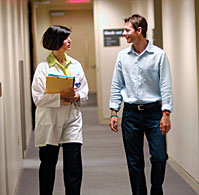UAB Cancer Care Follows a New Path
 |
Cancer survivor Jason Green (right) was able to meet with his entire treatment team—including surgical oncologist Martin Heslin—on his first day of appointments at UAB. |
By Josh Till
A cancer diagnosis is a passport into unfamiliar territory—a land that can be frightening and confusing, where the people speak a different language and follow unusual customs. Because the journey can be a long one, it helps to have a map, good directions, and experienced guides who can show you where to go and what to do. You’ll find them at the UAB Comprehensive Cancer Center, which has embarked on a far-reaching effort to make that journey easier—and quicker—for patients from their very first visit.
Essentially, the Cancer Center’s new Integrated Multidisciplinary Cancer Care Program (IMCCP) makes cancer treatment at UAB easier to navigate. Cancer Center director Edward Partridge, M.D., says the initiative brings together all of the various aspects of cancer treatment, streamlining the process for patients and improving the overall experience for them and their families.
“Cancer patients will get ‘one-stop shopping,’” Partridge says. “They want rapid diagnosis, same-visit consultation with all their specialists, and good communication with their care team. The IMCCP can provide all that and more.” He adds that the Cancer Center has long been a proponent of multidisciplinary care—combining various specialists from different fields into one team to provide more efficient and effective care—and he expects the IMCCP to raise that care to the next level.
One Day, One Place
The best way to understand the IMCCP, Partridge says, is to describe the ideal first-day experience of a cancer patient. Each clinic will have a full-time patient care coordinator (PCC), who will contact each patient prior to the first visit to answer any questions—about anything from parking to what they should bring with them—and make sure all appropriate records, lab work, and scans arrive at the clinic in time for the appointment.
“The PCC will coordinate all the logistics for those first-day clinics,” Partridge says. “Then patients will be able to see specialists, including medical, radiation, and surgical oncologists, in one day, and within a week, they will receive a comprehensive treatment plan recommended by their multidisciplinary team.”
In addition, a volunteer Cancer Center ambassador will greet each patient, orient him or her to the clinic area, and provide general information to help navigate the UAB system—another piece of unfamiliar territory for many patients. “These volunteers will also be available to guide patients from one appointment to the next during their first-day visit,” says Callie Dunaway, the Cancer Center’s volunteer relations manager. “The goal of the volunteer program is to provide patients with a friendly face who can help guide them through that first day.”
Time Advantage
“A key benefit of the IMCCP for patients is time,” Partridge says. “For example, a woman who discovers a breast lump may have, on average, 77 days between her visit with her primary care physician and her visit with a medical oncologist in a traditional clinical path. In the IMCCP path, that time decreases to 37 days.”
On that first day in the clinic, each patient will receive personalized counseling about his or her treatment options and information about psychosocial support services that are available. Following the consultation with the specialists, the PCC can schedule the patient’s initial treatment in many cases.
Another new strategy is the development of a program for the rapid evaluation and treatment of cancer patients, especially outside regular business hours. “This is something that our patients have needed for quite some time,” Partridge says.
Patient Proof
Partridge is confident that the IMCCP initiative can revolutionize the patient experience throughout the Cancer Center because he has already seen it happen in the area of gastrointestinal (GI) cancer, directed by Martin Heslin, M.D.

Follow GI cancer survivor Jason Green through a day at the Kirklin Clinic. |
“In 2000, we were having difficulty getting our GI cancer patients through the system,” says Heslin, a Cancer Center scientist. “So we met with all of the various specialists to find out when everyone’s clinics were. Then we began looking into how we could coordinate those clinics to maximize that time to benefit both the patient and the doctors.”
The result is the Multidisciplinary Gastrointestinal Cancer Clinic. Launched in 2001, it has proven to be a highly effective treatment model, Heslin says, and maintained a 99 percent satisfaction rate among its patients. Today the IMCCP is adapting the GI clinic’s practices and expanding them throughout the Cancer Center. Heslin leads the program, which is supported by a grant of nearly $4 million over four years from the UAB Health System—one of the largest grants of its type.
The ultimate goal is to integrate the IMCCP into all UAB cancer clinics, says Partridge. He hopes that the program will improve care and satisfaction for patients, families, and the physicians who refer them to UAB—from day one through the completion of treatment.
“Quality cancer care is the flagship of UAB,” Partridge says. “The Cancer Center is committed to improving our systems of delivering cutting-edge, compassionate care. To have this integrated model of care is, to me, plain common sense.”
This article originally appeared in Crossroads, the magazine of the UAB Comprehensive Cancer Center.